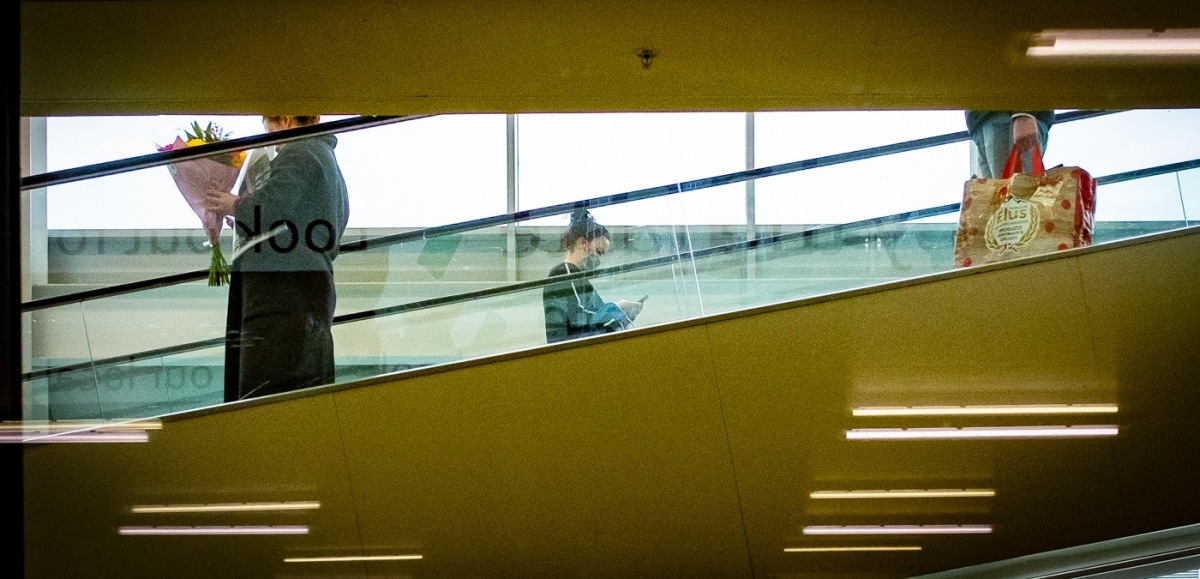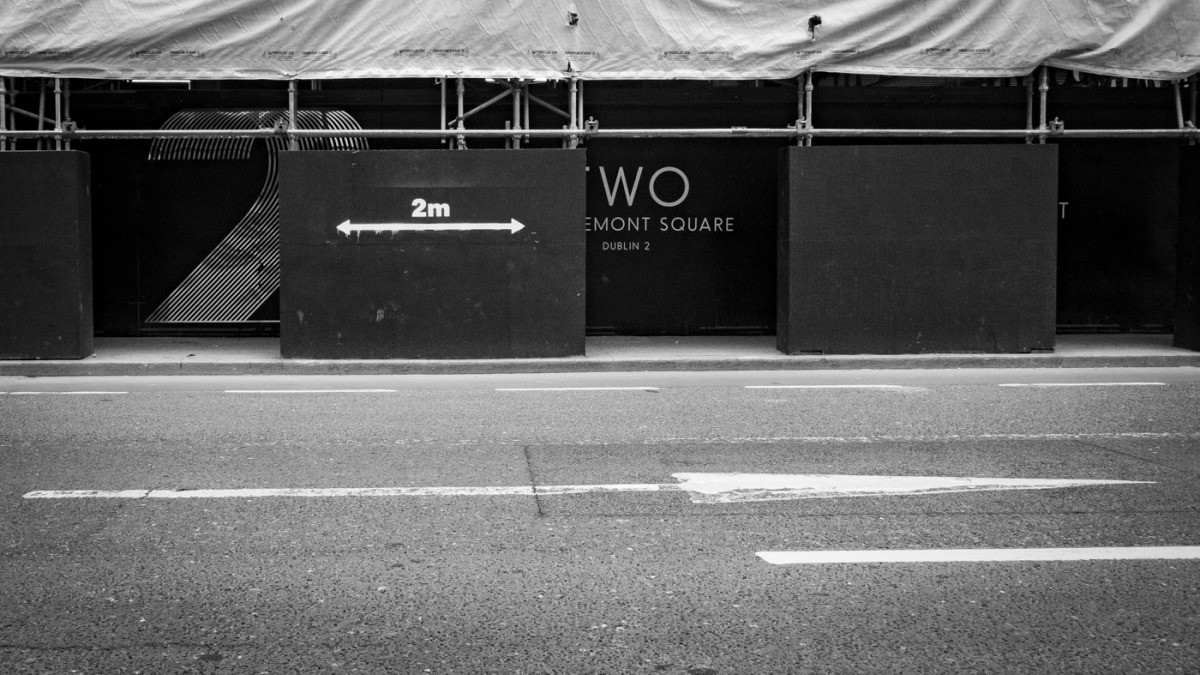On October 5th of this year, Minister for Health Stephen Donnelly spoke before the Dáil during a debate to extend the legal framework for restrictions in the State – the sunset clause of the Health Amendments (Covid-19) Act 2021 – for three months. He stated that there was no intention to extend the restrictions beyond October 22nd, but that they wished to keep the legal framework in place in case of the need for further restrictions or lockdowns.
This was clearly a lie, or ignorance on an unforgiveable scale. It cannot be both.
In the interim, hospitalisations related to COVID-19 have steadily climbed, and the wheel of fear and dread has begun to turn again, quickly gathering pace.
Thankfully, the government are attempting to turn the tide by extending the need for the Covid certification pass to theatre and cinemagoers, as well as banning nativity plays and playdates, thus surely halting the inevitable pressure that is being mounted on our health system.
Cork-based GP Dr Eoghan Deasy argues that the harms of ongoing and future mandated restrictions including vaccine passports will outweigh any benefits to Irish societyhttps://t.co/DTpLTkflZ8@broadsheet_ie @BowesChay @indepdubnrth @PD03662439 @BillyRalph
Images @danieleidiniph1— CassandraVoices (@VoicesCassandra) July 4, 2021
Inherently Illiberal
I must state from the outset that I am vehemently against the concept of a vaccine passport or vaccine mandates. I believe them to be inherently illiberal and it pains me to see the willingness with which we have adopted them into our society.
I acknowledge that when an issue produces such a visceral response, there is an increased likelihood that my reasoning may be faulty. Having read Daniel Kahnemann’s Thinking, Fast and Slow , I recognise that instinct and emotion can often cloud clear judgement. Hence, I have attempted to examine the principal arguments for and against vaccine passports in the context of the coronavirus pandemic to see if I can or will come to a different conclusion.
I take COVID-19 extremely seriously and witness the impact of the pandemic on the patients that I meet every day. This relates not just to actual illness but to the myriad other issues, both medical and non-medical that the past twenty-two months have created for them.
I support vaccination but not forced inoculation in the same way that I support appropriate medical treatment, not forced care. I worry that unnecessary interventions will create long-term sequalae that cannot be predicted, in the same way that inappropriate prescribing of medications does.
A colonial legacy, a distrust of a mercantilist pharmaceutical industry and erosion of democracy jeopardise preserving population health through vaccination write MSF's Francoise Duroch & Duncan McLeanhttps://t.co/brW41215h9@broadsheet_ie @BallouxFrancois @FrancoiseDuroch
— CassandraVoices (@VoicesCassandra) January 16, 2021
Preventing the Spread?
The most obvious argument in favour of vaccine certification is that it should prevent the spread of disease in an enclosed area. The certificate will work to protect both vaccinated and unvaccinated from contracting and spreading the disease and reducing the burden on the hospital system.
Unfortunately, there is absolutely no evidence that this is the case. Vaccinated citizens have been readily demonstrated to be able to contract and transmit the virus in the exact same manner as an unvaccinated person.
A recent Lancet study demonstrated that vaccination reduced the risk of Delta variant infection and accelerated viral clearance. This is great news, demonstrating that vaccines are effective. However, fully vaccinated individuals with breakthrough infections had peak viral load similar to unvaccinated cases, and could efficiently transmit infection in household settings, including to fully vaccinated contacts.[i]
If vaccinated and unvaccinated persons are equally capable of transmitting a virus, why do we insist on segregation and marginalisation of a significant minority of our population?
Reflecing on his long experience, whisteblower Chay Bowes concludes the Irish health system perpetuates dysfunction to the benefit of a private systemhttps://t.co/n0qDKuPcqv@BowesChay @broadsheet_ie @VillageMagIRE @caulmick @DrMarkMurphy @health_irish @RoryHearne @vincentbrowne
— CassandraVoices (@VoicesCassandra) November 16, 2021
Pandemic of the Unvaccinated?
The second argument commonly encountered is that it is the segment of the population who are unvaccinated by choice who are creating the ICU and hospital bed capacity issues.
As of November 17th 52% of patients are unvaccinated, with a significant percentage of this population also immunocompromised. According to Minister Donnelly, 98% of the vaccinated ICU patients are immunocompromised. On this basis, there is a strong likelihood that a significant proportion of the unvaccinated cohort are not unvaccinated by choice but because they are too unwell to receive the vaccine.
This is speculative on my part but is worth considering, and requires refutation.
Another argument advanced is that full participation in society is not free and requires solidarity on the part of the individual citizen: Thus, “Play your part. Protect yourself. Protect others” is a common slogan.
David Robert Grimes wrote an essay recently for The Guardian, comparing smallpox vaccine mandates in the early 1900’s to today’s issues. Of course, he neglected to mention that there was no vaccine passports in use at the time for participating in normal life, and provides no justification for them other than that they represent a mark of ‘solidarity.’
He also states that participation in society is not free, and that freedom comes at a cost, which is somewhat paradoxical. There is an expectation of brotherhood in society. However, if brotherhood is coerced against someone’s will, it is difficult to define it so.
I have not seen any evidence that prominent politicians during the smallpox era demanded that unvaccinated people should be banned from supermarkets and public transport. Does this evoke the spirit of fraternité?
Finally, although never explicitly stated in Ireland, vaccine certification is certainly an effective measure to improve uptake of a vaccine.
Whether one defines this as a nudge, gentle encouragement or coercion is a different argument. When I asked the Irish College of General Practitioners their position on the implementation of this system, they replied that ‘these people (the unvaccinated) may particularly benefit from national interventions to promote vaccination and limit the spread of COVID-19’.
This statement is certainly open to interpretation. Undoubtedly, it has been effective in ensuring increased take-up of the vaccine in young adults – young people who may not have bothered otherwise with brother- and sisterhood.
In a Machiavellian sense, this is the only true and potentially justifiable reason for a vaccine passport to be introduced in a civilised society. I cannot see another. Unfortunately, even 100% vaccination uptake, as in Gibraltar, has not resulted in the resolution of pandemic issues, with rising case numbers among the vaccinated causing all large Christmas activities to be cancelled.
At this point in the pandemic, the above justification in Ireland no longer holds water. Ireland has one of the highest vaccination rates in the world, with 93% of the eligible adult population fully vaccinated.
One should therefore assume that the remaining 7% of the ‘non-cooperating’ population are much more likely to consider a certification system coercive and will exacerbate their own fears of over-intervention by the State and unwelcome intrusion into their private lives.
Someone who argues that this is for the benefit of the unvaccinated in protecting them from society does not do so in good faith. If someone does not wish to be inoculated at this point, there is more than a strong possibility that they do not wish to take up the kind offer of a jab.
A certification system hence is more likely to have the inverse effect of its presumed benign intention. It is more likely to convince them further that the State wishes to harm and to segregate them against their wishes from a society that has already, by and large, shunned them.
Liam Deegan worries that the extreme discrimination against unvaccinated witnessed in Lithuania is a foretaste for what is to come elsewhere.https://t.co/iPfNXuZnNs@LiamDeegan3 @j_reilly33 @danieleidiniph1 @broadsheet_ie @DLangwallner @BowesChay @battleforeurope
— CassandraVoices (@VoicesCassandra) October 27, 2021
State of Distrust
There has been no attempt to understand any of the multiple reasons why people do not wish to receive this vaccine. Distrust of the State, distrust of the pharmaceutical industry, distrust of the healthcare industry, anecdotal reports of adverse effects and concerns regarding under-reporting, the list is varied. The consistent link between all these issues/concerns is that of distrust.
Many papers have been written on the subject of discussing vaccine hesitancy as a doctor with a patient. All suggest addressing hesitancy with compassion and understanding as decision-making around vaccination entails a complex mix of cultural, psychosocial, spiritual, political, and cognitive factors.[ii]
Reasons for vaccine hesitancy fit into three categories: lack of confidence (in effectiveness, safety, the system, or policy makers), complacency (perceived low risk of acquiring VPDs), and lack of convenience (in the availability, accessibility, and appeal of immunization services, including time, place, language, and cultural contexts).
All suggest addressing the patient’s concerns carefully, discussing with openness and honesty any potential side-effects as well as advocating the benefits, such as they are.
Has any of this been done at any point during the pandemic with the vaccine hesitant? Vaccine passports are not a tool to advocate for immunisation in a humane and empathic manner and it is equally certain that the most effective way of fomenting further distrust is to patronise people for their ‘stupidity’ in doubting the effectiveness of a medical intervention, while downplaying the potential for any side-effects and then to mandate the intervention as a necessity for full participation in normal society, such as it is.
Richard Kearney's Touch asserts the importance of physical contant in healing. Crippling anxiety in the wake of COVID-19 indicates a need for medicine to reform.https://t.co/4SLoA3YFaK@broadsheet_ie @BowesChay @indepdubnrth @corourke91 @itsmybike @NMcDevitt @iHealthReform
— CassandraVoices (@VoicesCassandra) December 1, 2021
Scapegoating
Instead of focusing on and congratulating the 94% of the eligible adult population who have been vaccinated, we have decided to scapegoat and segregate the dirty few who have not complied with government directives.
As a reminder, segregation has never been an attractive or effective feature of a functioning society. I make no lazy comparison to Nazi Germany, but rather suggest that people consider the State’s recent attitudes to same-sex relationships.
It should not be forgotten that homosexuality was only decriminalised in Ireland in 1993. That was a horrible and unjust law, horridly intruding into the lives of normal people. Same-sex marriage was legalised six short years ago in 2015.
Can any sane person reasonably make the case that it was legitimate or more importantly, healthy for a society to deny that two private citizens who love each other should be allowed to spend their lives together in a loving, equal relationship? That it was reasonable that same-sex marriage was such a danger to society that it had to remain illegal in the twenty-first century?
By this logic, are the unvaccinated so lethally unclean that it is worth intentionally re-dividing society? That it is worth every citizen who wishes to eat in a restaurant having to demonstrate by law a private medical decision to a waiter that has no interest and no business in knowing same?
The State is not a benign entity and is capable of dreadful, discriminatory decisions that have long-lasting impacts of the fabric of the country that we live in. Our long history of governmental corruption, cronyism and cover-ups at the cost to its people did not magically disappeared at the onset of a pandemic to be replaced by a wonderful, altruistic body guided by love and the rights of the individual.
Dr Billy Ralph contrasts his work in NHS integrated services with privatised Irish GP care & argues the government bought compliance of GPs during the pandemic.https://t.co/p3EEdHlwPC@broadsheet_ie @BowesChay @DrMarkMurphy @jlamber55605930 @indepdubnrth @BillyRalph
— CassandraVoices (@VoicesCassandra) November 9, 2021
Marginalisation
We should also consider the demographics of some of the people who do not wish to be vaccinated. People with lower levels of household income and those living in disadvantaged areas are demonstrably associated with increased likelihood of vaccine resistance and hesitancy.
A recent survey also demonstrated that BAME people are a minimum of 25% less likely to take up the offer of the Covid vaccine.
It is regularly reported that lockdowns and prolonged periods of state-imposed restrictions have had the most demonstrably negative effects on the exact population groups who are also hesitant to receive the vaccine.
Therefore, we have managed to punish and further marginalise the very people who have suffered the most throughout this pandemic and will likely suffer the most in the years of anticipated turmoil ahead.
This is not to denigrate the many wonderful, intelligent people who quite rightly question the manner in which they feel their country is being governed and directed but to highlight the unnecessary dual suffering that many people will encounter in the months and years ahead.
In any other time, scepticism and resistance to dictates targeting minorities would be celebrated, not scorned. We should hold our leaders to a high standard at all times, not allow them easy opportunities for deflection from their own failings and label almost everything that does not agree with State narrative as “misinformation.”
Again, instead of trying to understand why people do not wish to be injected with a treatment that they consider dangerous and unproven, and to try to convince in a humane and empathic manner, we have instead chosen to demonise and make them the culprits for the current issues that the hospital system faces in Ireland.
Do we wish to follow the example of Singapore and begin charging patients who become ill and are unvaccinated by choice? Do we wish to follow the lead of Australia and send our citizens to quarantine camps against their wishes? Do we wish to follow the lead of Austria and lockdown the unvaccinated, and now mandate vaccines for the whole population?
Why are these questions not being asked and answer by the opposition political parties in Ireland? Liberalism is defined as a political and social philosophy that promotes individual rights, civil liberties, democracy, and free enterprise and is supposed to be the cornerstone of left-wing politics.
The presumed left, including Sinn Fein, Labour, the Social Democrats, People before Profit, have been pathetic in their lack of any attempt to hold the State to account. A strong opposition is the cornerstone of democracy, and it is not present currently in Ireland.

Image (c) Daniele Idini.
Public Health Department
I have discussed vaccine certification with the local public health department in relation to the management of this pandemic. The doctor that I spoke to readily admitted that there is no medical indication for the use of vaccine certification and was shocked at the extension of the recent legislation in October.
Hence, my surprise at the recent declarations by Colm Henry and Ina Kelly, president of the IMO, that the public should walk out of pubs or restaurants that are not asking for Covid 19 digital certificates.
There remains no evidence whatsoever that vaccine certification has made any improvement to the management of the COVID-19 pandemic in any country that it has been used.
An Israeli paper examining the effects of their ‘Green Pass’ concluded that apart from the coercive effects of increasing vaccine uptake[iii], there is no evidence that the use of a passport system reduces morbidity loads on a population.
To repeat, there is no public health evidence for the intentional segregation of society. None. Zero. Nada. Zilch.
Anyone who argues that there is should be immediately dismissed as a fool. However, if you wish to look at the data, the HSPC have kindly provided information on COVID-19 outbreaks in the Republic of Ireland.
In May of 2021, there had been a grand total of two outbreaks attributed to hairdressers/personal grooming services. By November, there are now twenty-two recorded. In May, there were ten outbreaks attributed to public houses. By November, there have been forty more.
Does anyone truly believe that presenting a piece of paper at the door achieves anything when the holder continues to have the potential to be highly infectious? There is no evidence that it improves either your safety or the safety of others.

Image (c) Daniele Idini
Misdirected Indication
There has also been a recent effort to blame the unvaccinated for various sad occurrences that have occurred because of the lack of capacity in the HSE. Thus, it was reported that a transplant operation was cancelled because unvaccinated patients occupied ICU beds and the procedure was unable to go ahead.
Blaming the unvaccinated for this is completely disingenuous and abdicates responsibility for decades of poor management. The reader should know that Ireland does not have a good reputation in the transplant world. We are currently 18th out of 24 countries in Europe, below Lithuania and Estonia in terms of organ transplantation per million people.
In 2015, Dr David Hickey, the transplant surgeon described in the Irish Independent that he was the only pancreatic transplant surgeon in the State. Despite multiple offers to the HSE to mentor two people to take over his role, nothing was done. The pancreatic transplant program was then moved to another hospital setting, against advice and without consultation. At the time, no transplants, despite their life-saving nature, took place over a nine-month period.
To consider that the people ‘clogging up the ICU’s’ are responsible for historically well-recognised governmental and state body failures is malicious.
The 2019 Euro Health Consumer Index places Ireland in last position, below Albania, North Macedonia, Latvia and Romania, countries all with their own issues, in terms of outpatient hospital waiting lists.
Ireland has the lowest rate of hospital consultants in the EU18, a fact heavily bemoaned by the Irish Medical Organisation. Shortages of GPs, shortages of nursing and allied health professionals, overcrowded emergency departments and public health failures have been reliable sources of outrage and headlines over the course of the past twenty years.
Fortunately, there is now a perfect fall guy in the shape of an unvaccinated person to take the ire of the populace.
The unvaccinated are at fault for five-year orthopaedic waiting lists, the unvaccinated are responsible for spiralling chronic diseases in an increasingly obese and unhealthy society. The unvaccinated are responsible for the lack of clinical staff living and working in this country.
It would be laughable were it not for the real human cost of such misdirected indignation and hatred.
If we are to blame the individual for the failings of the system, we should apply this logic to the others who place a heavier burden on the health system. The obese, the alcoholics, the smokers, the poor should all feel our wrath at the impact they place upon our hospitals. Perhaps an obesity cert would be an incentive for them to lose weight or keep them out of restaurants? That can only have positive results.
Frank Armstrong measures the health of the Irish republic in response to the pandemic, and argues for a social contract inclusive towards all who live here.https://t.co/Y2SCYfZab6@frankarmstrong2 @BowesChay @broadsheet_ie @indepdubnrth #COVID19
— CassandraVoices (@VoicesCassandra) May 27, 2021
Chaotic Interference
Continuing along this path of chaotic interference in people’s lives will have iatrogenic consequences. Professor Helen Townsend, director of the Self-Harm Research Group in the University of Nottingham, has described the likely severe long-term consequences of lockdowns and that these have never been accounted for in policy making19.
Has any consideration been given to the societal impacts of intentionally separating the ‘dirty dissenters’ from the rest of the country? If there is no public health evidence for overwhelming benefit, how can we justify such an enormous departure from normality?
The ethical implications of these decisions have clearly not been fully considered, if at all. It should be noted that the National Public Health Emergency Team does not have any bioethical or legal representation, an amazing fact considering the enormous decisions that have been made on the basis of their recommendations over the course of the past twenty months.
The Irish Council for Civil Liberties has repeatedly requested that such a representative should join NPHET, but this has been ignored. The ICCL, for what it is worth, has also stated their strong opposition to a domestic vaccine passport, stating that the system is discriminatory and has been developed without any meaningful consideration of human rights.
And yet still we persist and tolerate further encroachment into both our and our children’s lives. 50,000 people can go to a football match in the Aviva stadium, the CEO of the HSE can drink and rub shoulders with sporting royalty indoors without a mask, yet we think it is appropriate that nine-year-old children should be masked and instructed not to attend nativity plays.
190,000 children are currently living in poverty in Ireland, yet this is not a crisis worth addressing in the mainstream media. Instead, it is recommended to avoid playdates and sleepovers while Gary Barlow croons to thousands in the 3 Arena. It is preposterous and the antithesis of public health. It causes me great shame as a doctor that these measures are being carried out in the name of my profession.
I am unable to convince myself that a system of vaccine certification is a reasonable or ethical idea in an essentially fully vaccinated adult population for a virus that is transmissible regardless of your vaccination status.

Image (c) Daniele Idini.
A Thought Experiment
If you remain convinced that it is, I would like to propose a final thought experiment. Consider a politician or government that you dislike or fear. Consider your reaction if they were to have introduced a vaccine passport over the course of the past six months.
Would you agree with segregation of society if Donal Trump suggested it? Would you clap wholeheartedly if Vladimir Putin encouraged marginalisation of a minority of people who have not broken any laws? Would you dismiss civil rights concerns if Bolsanaro was championing minority-blaming and hatred?
If you would agree to all these questions, I would congratulate you on your single-minded conviction and realise that I will never convince you – as is assumed to be the case with all ‘anti-vaxxers’, a derogatory term that I despise.
Coercion and essentially forced vaccination signifies a complete failure of scientific and public health messaging. My sympathies lie with the people who are not currently welcome to participate in society on the basis of one personal decision which has not broken any law.
They have been stripped of their constitutional rights without seemingly without any recourse to due process. That should give anyone reason to pause and reflect. Without acknowledging it, we have become a country that has slipped, almost overnight, into an enduring state of fear and intolerance. I worry for the future and the country that my children will inhabit.
[i] Anika Singanayagam, PhD et al, ‘Community transmission and viral load kinetics of the SARS-CoV-2 delta (B.1.617.2) variant in vaccinated and unvaccinated individuals in the UK: a prospective, longitudinal, cohort study’, The Lancet, October 29, 2021, https://www.thelancet.com/journals/laninf/article/PIIS1473-3099(21)00648-4/fulltext
[ii] Shixin (Cindy) Shen and Vinita Dubey, ‘Addressing vaccine hesitancy: Clinical guidance for primary care physicians working with parents’, The College of Family Physicians of Canada, 2019 Mar; 65(3): 175–181. https://www.ncbi.nlm.nih.gov/pmc/articles/PMC6515949/
[iii] Ruth Waitzburg, ‘The Israeli Experience with the “Green Pass” Policy Highlights Issues to Be Considered by Policymakers in Other Countries,’ November 2021, International Journal of Environmental Research and Public Health, 18(21):11212. https://www.researchgate.net/publication/355819969_The_Israeli_Experience_with_the_Green_Pass_Policy_Highlights_Issues_to_Be_Considered_by_Policymakers_in_Other_Countries




